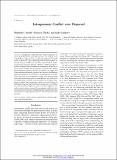Files in this item
Intragenomic conflict over dispersal
Item metadata
| dc.contributor.author | Farrell, Elizabeth | |
| dc.contributor.author | Ubeda, Francisco | |
| dc.contributor.author | Gardner, Andy | |
| dc.date.accessioned | 2016-07-07T23:31:17Z | |
| dc.date.available | 2016-07-07T23:31:17Z | |
| dc.date.issued | 2015-09 | |
| dc.identifier | 178479211 | |
| dc.identifier | 6a98688e-3705-416f-9fd8-282cf4439e7e | |
| dc.identifier | 84941214884 | |
| dc.identifier | 000361011800001 | |
| dc.identifier.citation | Farrell , E , Ubeda , F & Gardner , A 2015 , ' Intragenomic conflict over dispersal ' , American Naturalist , vol. 186 , no. 3 . https://doi.org/10.1086/682275 | en |
| dc.identifier.issn | 0003-0147 | |
| dc.identifier.uri | https://hdl.handle.net/10023/9091 | |
| dc.description.abstract | IIntragenomic conflict may arise when social partners are more related through one parent than the other, e.g. owing to individuals or gametes of one sex dispersing further prior to fertilization. In particular, genes originating from the former parent are favoured to promote selflessness and those originating from the latter parent are favoured to promote selfishness. Whilst the impact of patterns of dispersal on the evolution of intragenomic conflict has received recent attention, the consequences of intragenomic conflict for the evolution of dispersal remain to be explored. We suggest that, if the evolution of dispersal is driven at least in part by kin selection, then differential relatedness of social partners via their mothers versus their fathers may lead to an intragenomic conflict, with maternal-origin genes and paternal-origin genes favouring different rates of dispersal. As an illustration, we extend a classic model of the evolution of dispersal to explore how intragenomic conflict may arise between an individual’s maternal-origin and paternal-origin genes over whether or not that individual should disperse in order to ease kin competition. Our analysis reveals extensive potential for intragenomic conflict over dispersal predicts that genes underpinning dispersal phenotypes may exhibit parent-of-origin-specific expression, which will facilitate their discovery. | |
| dc.format.extent | 11 | |
| dc.format.extent | 882125 | |
| dc.language.iso | eng | |
| dc.relation.ispartof | American Naturalist | en |
| dc.subject | Genetic conflict | en |
| dc.subject | Genomic imprinting | en |
| dc.subject | Kin selection | en |
| dc.subject | Migration | en |
| dc.subject | Parent-of-origin effects | en |
| dc.subject | QH301 Biology | en |
| dc.subject.lcc | QH301 | en |
| dc.title | Intragenomic conflict over dispersal | en |
| dc.type | Journal article | en |
| dc.contributor.sponsor | NERC | en |
| dc.contributor.institution | University of St Andrews. School of Biology | en |
| dc.contributor.institution | University of St Andrews. Centre for Biological Diversity | en |
| dc.identifier.doi | https://doi.org/10.1086/682275 | |
| dc.description.status | Peer reviewed | en |
| dc.date.embargoedUntil | 2016-07-08 | |
| dc.identifier.grantnumber | NE/K009524/1 | en |
This item appears in the following Collection(s)
Items in the St Andrews Research Repository are protected by copyright, with all rights reserved, unless otherwise indicated.

